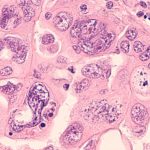 The World Health Organization (WHO) yesterday unveiled its first list of antibiotic-resistant priority pathogens – popularly known as “superbugs” – it believes pose the greatest threat to the world’s public health.
The World Health Organization (WHO) yesterday unveiled its first list of antibiotic-resistant priority pathogens – popularly known as “superbugs” – it believes pose the greatest threat to the world’s public health.
The list of 12 bacteria came as no surprise to Dr. Yohei Doi, director of the University of Pittsburgh Center for Innovative Antimicrobial Therapy.
“The list WHO provided accurately reflects the challenges we face at our hospitals today,” said Doi, also a UPMC infectious disease physician.
Three bacteria were designated “Priority 1: Critical” – Acinetobacter, Pseudomonas and Enterobacteriaceae. Doi noted that these are the most problematic pathogens because they are becoming resistant to multiple antibiotics, including carbapenems, which are last-resort antibiotics typically reserved for gravely ill patients with infections who aren’t responding to other treatments.
Doi’s laboratory collects samples of drug-resistant infections from hospitals, testing them against therapies with the goal of developing long-term solutions to the antimicrobial resistance crisis. Multiple health organizations, including the WHO and the U.S. Centers for Disease Control and Prevention, have named antimicrobial resistance as one of the biggest threats to human health.
The WHO’s new list is meant to spur governments to put in place policies that incentivize investing in basic science and advanced research and development in antibiotic discovery by both publicly funded agencies and the private sector.
“Antibiotic resistance is growing, and we are fast running out of treatment options. If we leave it to market forces alone, the new antibiotics we most urgently need are not going to be developed in time,” Dr. Marie-Paule Kieny, WHO’s assistant director-general for health systems and innovation, said in a news release.
Doi noted that progress is being made for Enterobacteriaceae, with several new antibiotics approved or nearing approval, but there continues to be a dearth of effective treatment options for multidrug-resistant Acinetobacter and Pseudomonas.
“Developing new antibiotics or other strategies that are active against these bacteria is challenging, both technologically and economically,” Doi said. “Public-private partnership is essential in advancing research and development in this field. As the WHO points out, investment in developing strategies to prevent infections and preserve the antibiotics we already have is also a high priority.”
UPMC has one of the nation’s oldest antibiotic stewardship programs. Among other responsibilities, the program reviews antibiotic requests for patients at UPMC’s hospitals to ensure that the patients are receiving the correct antibiotic at the best dosage for their infection, and not getting unnecessary or mismatched antibiotics.







